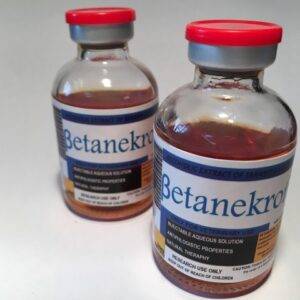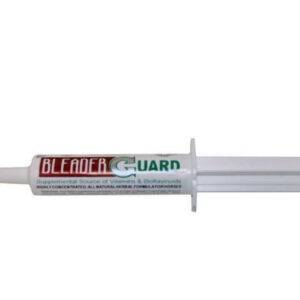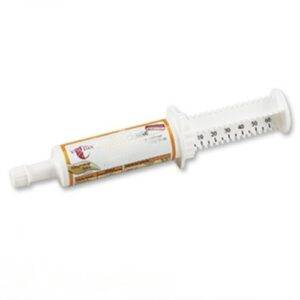Dexavet
Dexavet Injection is a veterinary corticosteroid containing dexamethasone, which is used to treat various inflammatory, allergic, and immune-mediated conditions in animals. Here’s a detailed overview of Dexavet Injection, including its uses, dosage, side effects, precautions, and other key information:
Key Component:
Dexamethasone: A synthetic glucocorticoid with potent anti-inflammatory and immunosuppressive properties. It mimics the effects of naturally occurring corticosteroids in the adrenal glands and is more potent than other corticosteroids like prednisone.
Uses of Dexavet Injection:
Dexavet is primarily used in the following conditions:
Anti-Inflammatory:
It reduces inflammation in conditions such as arthritis, tendonitis, bursitis, and other musculoskeletal issues.
Allergic Reactions:
Effective in managing severe allergic reactions such as anaphylaxis, hives, and skin allergies.
Immune System Disorders:
Used to treat autoimmune diseases where the immune system attacks the body’s own tissues (e.g., immune-mediated hemolytic anemia, thrombocytopenia).
Respiratory Conditions:
It is beneficial in managing inflammatory airway diseases, including heaves or chronic obstructive pulmonary disease (COPD) in horses.
Shock and Trauma:
Administered in cases of shock due to severe injury, trauma, or surgery to stabilize the animal and reduce inflammation.
Endocrine Disorders:
Used in the treatment of adrenal insufficiency where the body is not producing enough natural corticosteroids.
Cancer Management:
Sometimes used to reduce pain, swelling, or inflammation related to tumors or cancerous growths.
Dosage and Administration:
Administration Route: Dexavet can be given through intramuscular (IM), intravenous (IV), or subcutaneous (SC) injection, depending on the animal’s condition and the veterinarian’s preference.
Dosage:
Horses: Typically, a dose of 5 mg to 20 mg may be administered depending on the severity of the condition.
Cattle: Dosage ranges from 5 mg to 10 mg for shock or inflammatory diseases.
Dogs and Cats: The dosage varies based on weight and condition, usually between 0.1 mg/kg to 1.0 mg/kg body weight.
Important: Dosage must always be determined by a veterinarian, as the duration and frequency depend on the condition being treated and the specific animal.
Side Effects:
Although dexamethasone is highly effective, it may cause side effects, particularly when used long-term or at high doses:
Increased Thirst and Urination:
One of the most common side effects is polydipsia (increased thirst) and polyuria (frequent urination).
Increased Appetite:
Animals may exhibit an increase in appetite, which can lead to weight gain.
Immune Suppression:
Dexavet can suppress the immune system, increasing the risk of infections. It can also slow down the healing of wounds.
Gastrointestinal Issues:
Long-term or high-dose use can lead to gastrointestinal ulcers, bleeding, and even perforation, especially if used in combination with NSAIDs (non-steroidal anti-inflammatory drugs).
Laminitis in Horses:
Horses treated with corticosteroids like dexamethasone are at risk of developing laminitis, a painful condition that affects the hooves.
Adrenal Suppression:
Prolonged use can suppress the adrenal glands, leading to adrenal insufficiency. Abrupt cessation of long-term corticosteroid use can cause an adrenal crisis, which can be life-threatening.
Muscle Weakness and Atrophy:
Extended use can result in muscle weakness and loss of muscle mass.
Behavioral Changes:
Animals may experience mood swings, hyperactivity, or lethargy.
Electrolyte Imbalance:
Corticosteroids can lead to imbalances in sodium and potassium levels, especially with prolonged use.
Precautions:
Gradual Tapering:
If the animial has been on Dexavet for an extended period, the medication should be tapered off gradually to avoid adrenal crisis. Sudden cessation can lead to serious complications.
Monitor for Infections:
Due to its immunosuppressive effects, animals treated with Dexavet should be monitored for signs of infection. If any infection is suspected, a veterinarian should be consulted immediately.
Use in Pregnant Animals:
Use in pregnant animals should be approached with caution as corticosteroids can have adverse effects on fetal development.
Preexisting Conditions:
Animals with preexisting conditions such as diabetes, heart disease, kidney disease, or gastrointestinal ulcers should be monitored closely, as dexamethasone can exacerbate these conditions.
Combination with Other Drugs:
Combining Dexavet with other medications such as NSAIDs or diuretics requires caution due to increased risks of gastrointestinal issues or electrolyte imbalances.
Contraindications:
Active Infections: Dexavet should not be used in animals with active viral, bacterial, or fungal infections unless they are being treated with appropriate antimicrobial agents.
Diabetes: Dexavet can increase blood sugar levels and complicate diabetes management.
Gastrointestinal Ulcers: Animals with a history of ulcers should be monitored, as corticosteroids can worsen these conditions.
Storage:
Store Dexavet Injection in a cool, dry place, away from direct sunlight. It should not be frozen, and it should be kept out of reach of children and animals.
Conclusion:
Dexavet Injection is a versatile and potent corticosteroid used in veterinary medicine for managing a wide range of conditions, including inflammatory diseases, allergic reactions, and immune-mediated disorders. While it is highly effective, it must be used cautiously under veterinary supervision due to the potential for serious side effects, especially with prolonged use or high doses.
Regular monitoring of the animal’s health and adherence to veterinary guidance is essential when administering corticosteroids like Dexavet.





Reviews
There are no reviews yet.